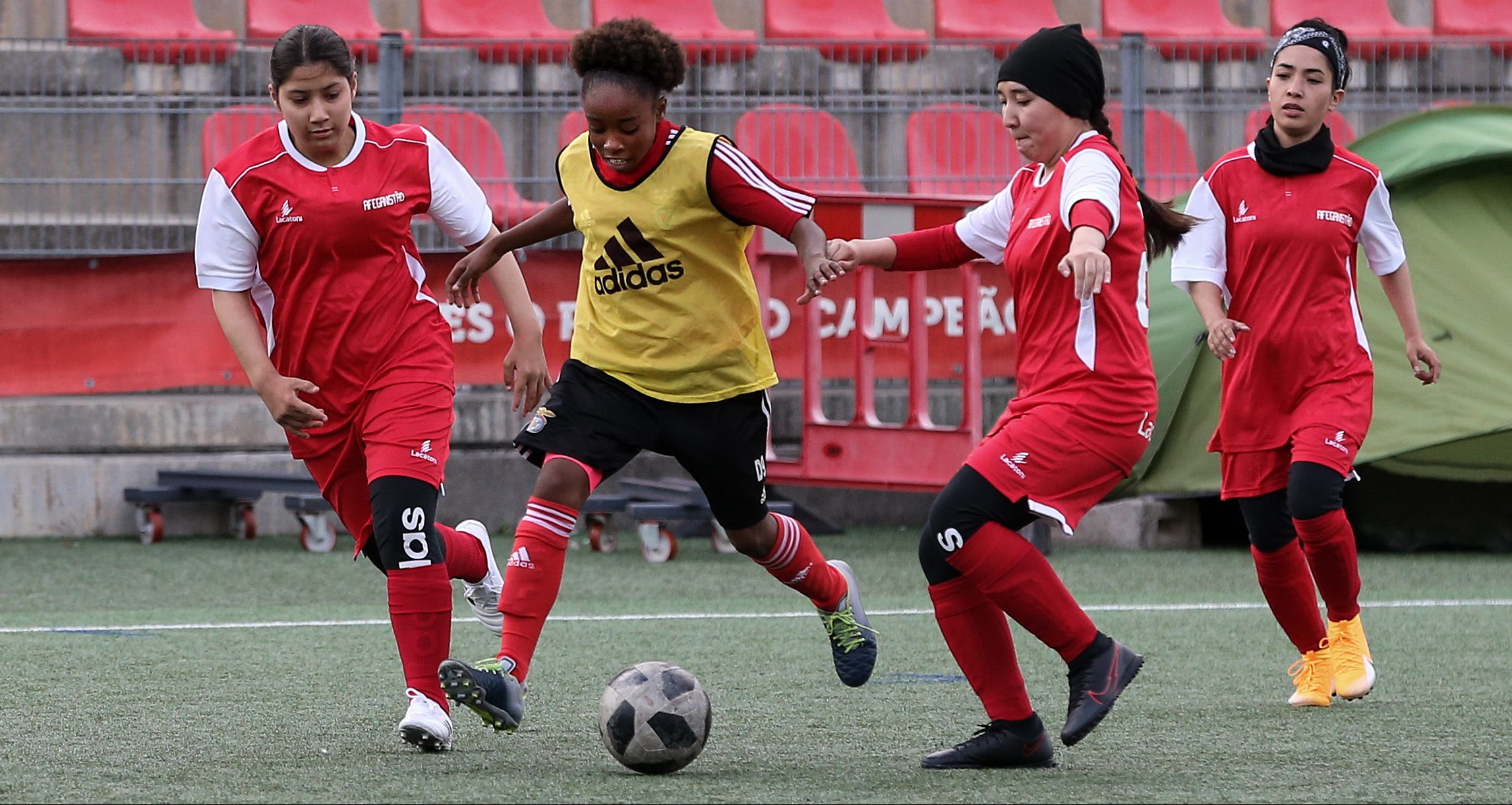Lisbon, Oct 3, 2021 (Lusa) – The Estádio da Luz as a setting to play was unthinkable two weeks ago for Sadaf Sharifzada and her colleagues from the youth teams of Afghanistan, but this Saturday they proved that soccer can be a weapon against intolerance.
When the dream of playing became a nightmare in Kabul, Portugal became a new beginning for 26 girls from the Afghan women’s soccer youth teams, who fled the country in the face of the Taliban’s return to power.
Now, the opponent was a Benfica youth team, made up of U-15 and U-16 players, in a joint training session where the result was not the most important thing, but every Afghan goal was a celebration.
With a sure look and speaking as fast as if she were still running away from her country, the 15-year-old girl confessed to Lusa the revolt of seeing the Taliban regime come back to power and restore restrictions to the freedom of women, for whom playing soccer can be an offense that can cost them their lives.
In her speech, the contradiction of feelings stands out: the joy of escaping a dark future and the concern for the families that stayed behind.
“I came with my brother, sister, and father, but my little brother and mother are still in Afghanistan. I am very worried about them. The situation is getting worse day by day. It is unbelievable, anything can happen. We should have the right to live like these girls here. I can’t do anything now, but I will try to show in the future that I am powerful,” she said in defiance, stressing, “[The Taliban] are not human.
foto: MANUEL DE ALMEIDA
They arrived in Lisbon on September 19, following a flight of more than 6,000 kilometers and after weeks of fear spent in hiding, trying to outwit opponents much tougher than they usually have on the field. And when the Afghan government collapsed, Sadaf still thought it was all just a joke.
“The day the Taliban came, I was at school and the other girls said ‘Let’s go home, the Taliban came.’ I made fun of it, told them not to worry and that it was just a joke, but when I got home and saw it on TV… My God, everything was destroyed in one day,” she recalled, while her classmates – dressed in red shirts, black ‘leggings’ under their shorts, and many with scarves on their heads – looked for the goal on the field.
A new game starts now in Portugal, “a good country” to start over, said the Afghan centerfielder, thanking the people for the welcome and the government’s effort to bring the families too. A feeling shared by Parisa Amiri, who, at 17, assumed the desire to assert herself in soccer and still study engineering.
“We are very happy to come to Portugal because in Afghanistan they wouldn’t let us play soccer and here we can play, we can have our goals here, we can improve our lives. These are our wishes: to play soccer and to be better players in the future,” the defender assured.
The Taliban threat to “cut off the heads” of women who played soccer still echoes in Parisa’s memory. “It is not right what they are doing. We have the right to study and play soccer,” she stressed, with tears still hanging in her eyes, as she recalled the days before fleeing the country: “Before escaping we were hiding with our families, a backpack, two pieces of clothing…”
On the bench, her teammates exchange smiles, chat, and go on to applaud some moves. Standing up and taking the game more seriously, Farkhunda Muhtaj almost continuously gives directions onto the field and talks to the players sitting behind her.
The 23-year-old captain of the Afghan women’s soccer team lives in Canada but came to Lisbon these days to help integrate these youngsters, for whom she was already a reference and highlighted the “opportunity of a lifetime” they found in Portugal: “They will now train in Portugal, get an education, already love the city and the country, and will positively impact Portuguese society,” she assured.
“In Afghanistan, playing soccer goes against social norms, so many women are not well regarded when competing in sports, but soccer is their identity, their passion, and they are determined. Being able to continue to play and have a new chapter in their life is a great opportunity for them and they will excel.
Besides the game on the artificial turf next to Luz Stadium, the Afghan girls also received a set of gifts from Benfica, including jerseys, cleats, and notebooks. The ‘red’ players and the president of the Benfica Foundation, Carlos Móia, were there to distribute the gifts.
“It’s a pleasure to welcome people who have gone through and are going through the internal problem with the Taliban. It’s our role, it’s the least we can do: receive people. And we, Portuguese, know how to receive”, he emphasized, adding: “I hope they stay in Portugal. We have to know how to welcome and accompany.


